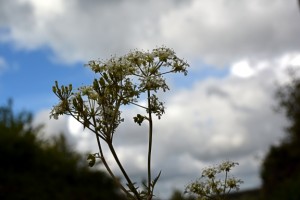,,,red campion, fool’s parsley, hogweed, rough chervil, common evening primrose, foxglove (winding down now), convolvulus (first of the season), tufted vetch, meadow buttercup, leopard’s bane, broad-leaved willowherb…
These are all super-common native plant species of the kind most people call weeds, but for me there are few more thrilling avenues to explore in natural history than these widespread British wildflowers. Of course there are many more spectacular and scientifically interesting species found elsewhere in the world, but none that better define the landscapes I write about, the landscapes I grew up in and that trigger my most immediate, honest response as a writer and as a human being.
The sight of red campion in the hedgerow (at its peak, a couple of weeks ago, it was breathtaking in its profusion) can set my heart racing. The Devon hedgerows themselves, which this spring I’ve been able to watch daily as they’ve thickened and quickened, are so bounteous, so diverse in composition, so vast you could spend most of a day just looking at one small stretch of one, identifying, photographing and cataloguing the plants on display. These hedgerows and the fields beyond form what can rightly be called a Fowlesian landscape, a landscape that is somehow so deeply rooted in many of us Britons that it is instantly recognisable at a level that has more to do with the gut than with the eye, instantly home, even for those who live in the city.
On Tuesday I wandered down a lane that led to a bridleway that led to a meadow bursting with clover and singing with bees. SO many bees here, bees all around us, up first thing in the morning and already about their business.
In that same meadow a pheasant broke cover just yards from my feet. At the end of last week I spotted on one of our garden shrubs a bronze shield bug. Haven’t seen one in years. These things too I find thrilling.
Although my bookshelves contain an ever increasing number of books on natural history (bear in mind that this is someone who requested – and received – W. S. Bristowe’s The World of Spiders for her twelfth birthday and still has that same copy) and though I rejoice in the current upsurge in popularity of nature writing by the likes of Robert Macfarlane and Helen Macdonald and Melissa Harrison, Marianne Taylor, Richard Kerridge, Patrick Barkham and Dave Goulson, I find it practically impossible to write about these landscapes except through fiction. The experience is too intimate, too revealing of self. There is the ever-present danger of slipping into a mode of expression that sounds like sentimentality, when what one wants to express is fierceness. Fierceness and passion and urgent necessity.
I’ve probably just inadvertently listed another ten reasons why I love Sarah Hall’s The Wolf Border so much. I could say sorry for harping on this book all the time, but I’m not going to.